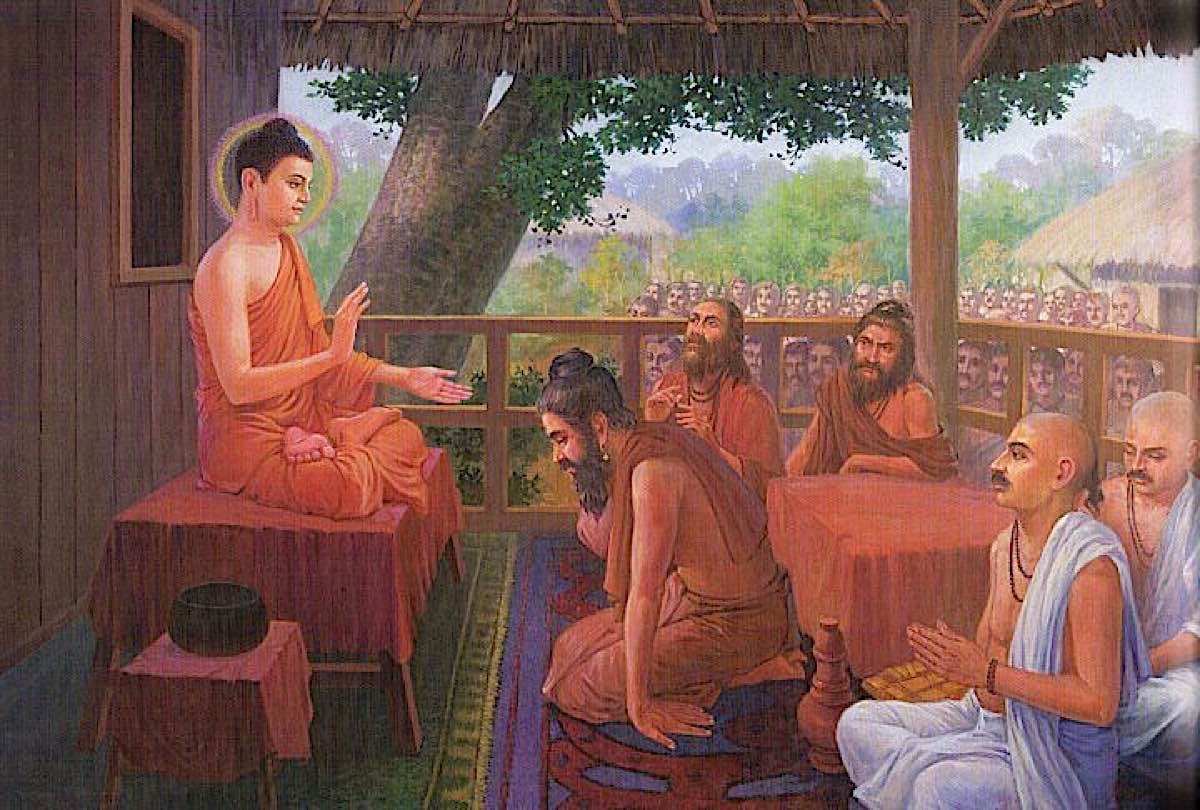Power of dana and generosity “within our means” — the Sutta stories of Anathapindika, who gave Buddha Jetavana park
Anathapindika is famous for his supreme generosity. He is the benefactor immortalized through his gift of Jetavana park — used in rainy seasons throughout the centuries by Buddhist monks for retreat. This great feat of generosity cost him “enough...

5. Discourses by the Blessed One
Of the forty-five rainy seasons[4] of his life as a teacher, the Buddha spent nineteen in Savatthi in Anathapindika’s monastery in the Jeta Grove. Whenever he spent the three or four months of the rainy season there, Anathapindika would usually visit him twice a day, often just to see him, but frequently to hear a discourse. Anathapindika was reticent about asking the Exalted One questions. As the most generous benefactor of the Order, he did not want to create the impression that he was merely bartering his contributions for personal advice. The donations were for him a matter of the heart, a joy, given without any thought of reward — they were in themselves sufficient for him. He thought that the monks and the Buddha would not regard the instruction as an obligation or a compensation for the benefactor, but that they would be a heart-felt joy for them, too.
Therefore, when Anathapindika came to the Buddha, he would sit quietly off to one side and wait to see whether the Exalted One would give him any instruction. If the Awakened One said nothing, Anathapindika would sometimes relate one of the episodes of his life, of which several have been recounted. He would wait to see whether the Exalted One had any comments to offer, approving or criticizing his behavior, or whether he would use that special event as a point of departure for a discourse. In this way he connected all that he experienced in his everyday life with the Teaching.
Many of the occasions when the Buddha gave instructions to Anathapindika have been recorded in the Pali canon. They constitute a comprehensive code of conduct for the conscientious lay follower of the Buddha, so that Anathapindika has also become a benefactor to all those in future times who are trying to follow the Teaching. These discourses, which are contained in the Anguttara Nikaya,[5] range from the simplest message to the most profound. A few are mentioned here, beginning with the most basic advice to the laity:
“Housefather, possessed of four things, the noble disciple has entered on the householder’s path of duty, a path which brings good repute and leads to the heaven world. What are the four?
“Herein, housefather, the noble disciple waits upon the order of monks with the offer of a robe, almsfood, lodging… and medicines for use in sickness. These are the four things.”
— AN 4.60
“Housefather, there are these four kinds of bliss to be won by the householder: …the bliss of ownership, the bliss of wealth, the bliss of debtlessness, the bliss of blamelessness.
“… A man has wealth acquired by energetic striving, amassed by strength of arm, won by sweat, lawful and lawfully gotten. At the thought: ‘Wealth is mine acquired by energetic striving…,’ bliss comes to him, satisfaction comes to him. This, housefather, is called, ‘the bliss of ownership.’
“… A man by means of wealth acquired by energetic striving… both enjoys his wealth and does meritorious deeds therewith. At the thought: ‘By means of wealth acquired… I both enjoy my wealth and do meritorious deeds,’ bliss comes to him, satisfaction comes to him. This, housefather, is called ‘the bliss of wealth.’
“… A man owes no debt great or small to anyone. At the thought: ‘I owe no debt, great or small, to anyone,’ bliss comes to him, satisfaction comes to him. This, householder, is called ‘the bliss of debtlessness.’
“… The noble disciple is blessed with blameless action of body, blameless action of speech, blameless action of mind. At the thought: ‘I am blessed with blameless action of body, speech, and mind,’ bliss comes to him, satisfaction comes to him. This is called ‘the bliss of blamelessness.’
“Such, housefather, are the four kinds of bliss to be won by the householder…”
— AN 4.62
“There are, O householder, five desirable, pleasant, and agreeable things which are rare in the world. What are those five? They are long life, beauty, happiness, fame and (rebirth in) a heaven. But of those five things, O householder, I do no teach that they are to be obtained by prayer or by vows. If one could obtain them by prayer or vows, who would not do it?
“For a noble disciple, O householder, who wishes to have long life, it is not befitting that he should pray for long life or take delight in so doing. He should rather follow a path of life that is conducive to longevity. By following such a path he will obtain long life, be it divine or human.
“For a noble disciple, O householder, who wishes to have beauty… happiness… fame (rebirth in) a heaven, it is not befitting that he should pray for them or take delight in so doing. He should rather follow a path of life that is conducive to beauty… happiness… fame… (rebirth in) a heaven. By following such a path he will obtain beauty, happiness, fame, and (rebirth in) a heaven.”
— AN 5.43
“Householder, there are five reasons for getting rich. What five?
“… A noble disciple with riches gotten by work and zeal, gathered by the strength of the arm, earned by the sweat of the brow, justly obtained in a lawful way, makes himself happy, glad, and keeps that happiness; he makes his parents happy, glad, and keeps them so; so likewise his wife and children, and his servants.
“… When riches are thus gotten, he makes his friends and companions happy, glad, and keeps them so.
“… When riches are thus gotten, ill-luck… is warded off, and he keeps his goods in safety.
“… When riches are thus gotten, he makes the five oblations to kin, guests, spirit, kings and deities.
“… When riches are thus gotten, the noble disciple institutes offerings of lofty aim, celestial, ripening to happiness, leading heavenward, for all those recluses and good men who abstain from pride and indolence, who bear all things in patience and humility, each mastering self, each calming self, each perfecting self.
“Now if the wealth of that noble disciple, heeding these five reasons, come to destruction, let him consider thus: ‘At least I’ve heeded those reasons for getting rich, but my wealth has gone!’ — thus he is not upset. And if his wealth increase, let him think: ‘Truly, I’ve heeded those reasons and my wealth has grown!’ — thus he is not upset in either case.”
— AN 5.41
The importance of the preceding discourses is further emphasized by the fact that the Buddha impressed them again on Anathapindika on another occasion in a slightly different form. On that occasion he said to him:
“Housefather, there are these four conditions (to realize which is) desirable, dear, delightful, hard to win in the world. What four?
“(The wish:) ‘Oh may wealth by lawful means come to me!’
“‘Wealth being gotten by lawful means, may good report attend me along with my kinsmen and teachers!’
“‘… May I live long and reach great age!’
“‘… When body breaks up, on the other side of death may I attain the heaven world!’
“Now, housefather, to the winning of these four conditions, four conditions conduce. What four?
“Perfection of faith, perfection of virtue, perfection of generosity, and perfection of wisdom.”
— AN 4.61
Faith can only be won if one fully acknowledges the Blessed One and his message about the nature of existence. One can only attain virtue if one fulfills the five minimum precepts for the moral life. Generosity is possessed by one who is free from the defect of avarice. One achieves wisdom when one realizes that if the heart is riddled with worldly passions, malevolence, lassitude, agitation, absent-mindedness, and doubt, then one does what should not be done and fails to do what should be done.
But one who does evil and neglects good, will lose his reputation and his good fortune. On the other hand, one who constantly investigates and observes his inner impulses and motives, is one who begins to overcome the five hindrances.[6] Hence their conquest is a consequence of wisdom. If the noble disciple — through faith, virtue, generosity, and wisdom — is well on the way to obtaining the four desired things, namely, wealth, good reputation, long life, and a path to a good rebirth, then he uses his money to accomplish four good deeds. He makes himself, his family, as well as his friends happy; he avoids accidents; he performs the five above-mentioned duties; and he supports genuine ascetics and priests. By whomever wealth has been spent in other than these four ways, those riches have not fulfilled their purpose, and they have been senselessly squandered. But whoever has diminished his wealth because of spending it for these four purposes, has used it in meaningful way. (AN 4.61)
On yet another occasion, the Buddha explained the difference between right and wrong conduct for the lay disciple in the discourse on people who indulge in worldly pleasures. There he says: The most foolish kind of person is one who, having obtained possessions in dishonest ways, does not even enjoy the use of them himself, and neither does he use them to benefit others. Slightly more sensible is the person who at least derives happiness and joy from ill-gotten gains. Still more sensible is the one who uses them to make others happy. Even on these lowest planes of forcible and illegal acquisition of money and goods which the ordinary person indignantly and indiscriminately condemns, the Awakened One sees fine distinctions in the behavior and attitudes of people.
The person who recognizes that the elementary purpose of grasping for wealth is at least to obtain some comfort for himself, could be made to see how, through having an honest income, he can obtain more benefit. And one who derives additional pleasure by giving some pleasure to others too, will readily understand that he has obviously given no joy to those whom he has cheated or robbed, while by making money honestly, he does not hurt anyone.
The second group of people are those who earn money entirely in dishonest ways but at least partly through honest work. Among these, too, are those who bring joy neither to themselves nor to others; those who at least enjoy their wealth; and those who also gladden others. Finally, the third group consists of those people who earn their living entirely in honorable ways and likewise fall under the four groups.
In the last case, there are again two types: those who are strongly attached to their wealth and being infatuated are unaware of its inherent danger, not seeking a way out of it; and there are those who are not attached to their wealth and not infatuated by it, but are aware of its inherent dangers and know the way out of it. So there are ten types of people who enjoy worldly pleasures concerned with wealth. (AN 5.91)
Once the Buddha asked Anathapindika whether alms were provided in his house. This refers, according to the Commentary, only to alms given to the needy. The Buddha knew, of course, that alms were generously given to the Order of Monks (the Sangha) in Anathapindika’s house. From this arose a talk on the qualitative grades of excellency in giving. The Buddha explained: “Whether one gives coarse or choice alms, if one gives it without respect and politeness, not with one’s own hand, gives only left-overs, and without belief in result of actions, then wherever he is reborn as a result of his giving of alms, his heart will have no inclination for fine food and clothing, fine vehicles, for the finer five sense-objects. His children, wife, servants and laborers will not obey him, not listen to him, and not pay him attention. And why is that so? Because this is the result of actions done without respect.”
In connection with this, the Buddha told how, in an earlier life, as a rich brahman called Velama, he himself had distributed an enormous amount of alms but none of the recipients had been worthy of the gifts. Far more meritorious than large donations to unworthy people would be a single feeding of noble disciples, from stream-winners to arahants. Even more meritorious would be the feeding of a paccekabuddha or of a hundred paccekabuddhas, and even more so the giving of alms to a Buddha, or the building of a monastery.
But better yet would be taking refuge in the Buddha, the Dhamma and the Sangha. And this deed would be perfected if one observed the five precepts. It would be still better if one could imbibe a slight fragrance, if only for a moment, of an all-encompassing radiation of love. The best of all, however, the ultimate, would be to cultivate, even for the time of a finger-snap, the thought of impermanence. (AN 9.20)
This speech shows the gradations of practice: of giving, of virtue, of the excellence of universal love, and finally, the unwavering realization of the impermanence of all conditioned things. Without making efforts in giving, in virtue, and in impartial love for all fellow creatures, the concentrated contemplation of impermanence is not possible; for in peace and quiet which this practice requires, pangs of conscience or other dark thoughts can arise.
This exposition on the kinds of giving recalls another short discourse. It is the only one in which Anathapindika himself asks a question, namely, how many were there worthy of receiving gifts. The Buddha answered that there were two kinds: those who were on the way to liberation, and those who had already attained it. (A II.27)
While in the talks mentioned thus far the purification of the heart has been more or less indirectly stressed, at another time the subject was directly approached. On that occasion the Buddha said to Anathapindika: “If the heart is corrupted, then all actions, words, and thoughts are tainted, too. Such a person will be carried away by his passions and will have an unhappy death, (just as) gables, rafters, and walls of a badly roofed house are unprotected and will decay because they will rot when drenched with rain.” (AN 3.107-108)
One time Anathapindika went with several hundred lay followers to the Buddha, who spoke to them thus: “To be sure, you householders provide the monastic community with clothing, food, shelter, and medicine, but you should not be satisfied with that. May you also from time to time strive to enter and abide in the joy of (inner meditative) seclusion!”[7]
After these words the venerable Sariputta added the following:
“At a time when the noble disciple dwells in the joy of (meditative) seclusion, five things do not exist in him: there is no pain and grief connected with the senses;[8] no pleasure and gladness connected with the senses; no pain and grief connected with what is unwholesome;[9] no pleasure and gladness connected with what is unwholesome;[10] no pain and grief connected with what is wholesome.”[11]
— AN 5.176
On another occasion when Anathapindika and many lay followers again visited the Buddha, the blessed One said to Sariputta:
“A white-clad householder who is restrained in his actions according to the five precepts and who can, easily and without difficulty, obtain at will the four lofty mental abidings which bring happiness in the present — such a householder may, if he so wishes, declare of himself: ‘Destroyed for me is (rebirth in) hell, destroyed is animal rebirth, destroy the realm of ghosts; destroyed for me are the lower worlds, the unhappy destinies, the abysmal realms; I have entered the stream, no more subject to fall into the states of woe, affirmed, assured of final enlightenment.’
“In what five precepts are his actions restrained? A noble disciple abstains from killing, from taking what is not given, from wrong sensual behavior, from lying, and from intoxicants that cause indolence.
“And what are the four lofty mental abidings bringing happiness in the present, which he can obtain at will?
“A noble disciple has unshakable faith in the Buddha, unshakable faith in the Teaching, unshakable faith in the Order; and he is possessed of virtues beloved by the Nobles — virtues that are unbroken, unviolated, untarnished, without blemish, bringing freedom, praised by the wise, uninfluenced, conducive to concentration.
“These are the four lofty mental abidings bringing happiness in the present, which purify the impure mind and cleanse the unclean mind. These he obtains at will, easily and without difficulty.”
— AN 5.179
At another time the attainment of stream-entry was explained to Anathapindika in three different ways — but only to him alone. The Buddha said:
“When in the noble disciple the five fearsome evils have disappeared, when he possesses the four attributes of stream-entry, and if he understands wisely and well the noble method, then he can regard himself as a stream-enterer. However, one who kills, steals, engages in sexual misconduct, lies, and takes intoxicants, generates five fearsome evils both in the present and in the future, and experiences pain and grief in his mind. Whosoever keeps away from the five vices, for him the five fearsome evils are eliminated. Secondly, he possesses — as attributes of stream-entry — unshakable trust in the Buddha, in the Dhamma, in the Sangha, and he keeps his virtue unbroken. And thirdly, he has fully seen and penetrated the noble method, that is, the dependent origination.”
— AN 10.92
One incident is reported where Anathapindika wanted to visit the Buddha one morning, but because it was still too early, he went to the monastery of some brahman pilgrims. Since they knew him as a follower of the Buddha, they asked him which views the ascetic Gotama held. He replied that he didn’t know all the views of the Exalted One. To the question of which views the monks held, he replied again that he did not know all their views. Thereupon he was asked what view he himself held. He replied:
“What views I hold, O honorable ones, would not be difficult for me to explain. But may I first ask the honorable ones to present their own views. After that it will not be difficult for me to explain what kind of views I hold.”
The pilgrims explained their notions of the world. One held it to be eternal, another held it not to be eternal; one held it to be finite, another held it to be infinite; one believed that body and life were identical, others supposed them to be distinct; some believed that Enlightened Ones endured after death, others said that they were destroyed.
Then Anathapindika spoke: “Whichever of these views held, it could only come from one of two sources: either from one’s own unwise musings, or through the words of another. In either case, the view has arisen conditionally. Conditioned things, however, are transitory; and things of a transitory nature involve suffering. Hence, one who holds views and opinions clings to suffering, succumbs to suffering.”
Then the pilgrims wished to know what views Anathapindika held. He answered: “Whatever arises is transitory; the transitory is of the nature of suffering. But suffering does not belong to me, that is not me, that is not my self.”
Seeking a rebuttal, the pilgrims argued that he himself was involved in as much as he clung to the view he had just expressed. He replied that that was not the case, for he had perceived those facts in accordance with reality, and besides that, he knew the escape from it, as it really is — in other words, he used the view only as a means and in time would also discard it. Thereupon the pilgrims were unable to respond, felt defeated, and sat in silence.
Anathapindika went quietly to the Blessed One, reported the conversation to him, and heard the Buddha’s praise: “You were right, householder. You should guide those deluded ones more often into harmony with the truth.” And then he delighted and encouraged him with a discourse. After Anathapindika had left, The Blessed One said to the monks that even a monk who had lived one hundred years in the Order would not have been able to speak better to the pilgrims than Anathapindika the householder had done. (AN 10.93)
Finally, two other incidents can be reported: Anathapindika was ill and requested a visit from a monk in order to receive consolation. Because Anathapindika had done so much as a benefactor of the Order, there was no question that his request would be fulfilled. The first time, Venerable Ananda came to him; the second time, Venerable Sariputta. The Venerable Ananda said that one of untrained mind was afraid of death and of what came after it, because it lacked four kinds of trust: he did not believe in the Buddha, the Dhamma, the Sangha, nor did he possess the virtues which were dear to the noble ones. But Anathapindika replied that he had no fear of death. He possessed unshakable trust in the Buddha, in the Dhamma, and in the Sangha. As for the rules for householders, he knew of none which he was still violating. Then Venerable Ananda praised him and said that he had just declared the fruit of stream-entry. (SN 55.27)
When Venerable Sariputta visited, he said to Anathapindika that, unlike the untrained worldling for whom hell was imminent, he had faith in the Three Jewels and had not yielded to vice. If he were now to concentrate very strongly on his faith in the Buddha, the Dhamma, and the Sangha, and on his own virtue, then his sickness would disappear through this meditation. He did not, like those who were untrained, have wrong views, wrong intentions, wrong speech, wrong action, wrong livelihood, wrong effort, wrong mindfulness, wrong absorption, wrong knowledge, or wrong liberation. If he would consider the fact that he, as a stream-winner, was in possession of the ten noble factors, flowing in the direction of right liberation, then through this meditation his illness would vanish. Through the strengthening power of this contemplation, Anathapindika recalled his great good fortune to be a noble disciple, and because of this excellent spiritual medicine, the disease disappeared immediately. He stood up, invited the Venerable Sariputta to have his meal, and carried on a further discussion with him. At the end, the Venerable Sariputta gave him three verses to remember:
— SN 55.26; adapted from F. L. Woodward’s translation
Eighteen Anathapindika discourses have been briefly recounted. Fourteen were given at the Exalted One’s instigation; one arose when Anathapindika posed a question; in another he reported how he had taught others; and in two he was instructed by Venerable Ananda and Venerable Sariputta. These eighteen discourses reveal how the Buddha made the teaching clear to the laity and inspired them to joyful endeavors.

 AbJimroe
AbJimroe 
























![12 ebook templates for InDesign, PowerPoint, and Google Docs [free download]](https://knowledge.hubspot.com/hubfs/free-ebook-templates-1-20240529-4957105.webp)







